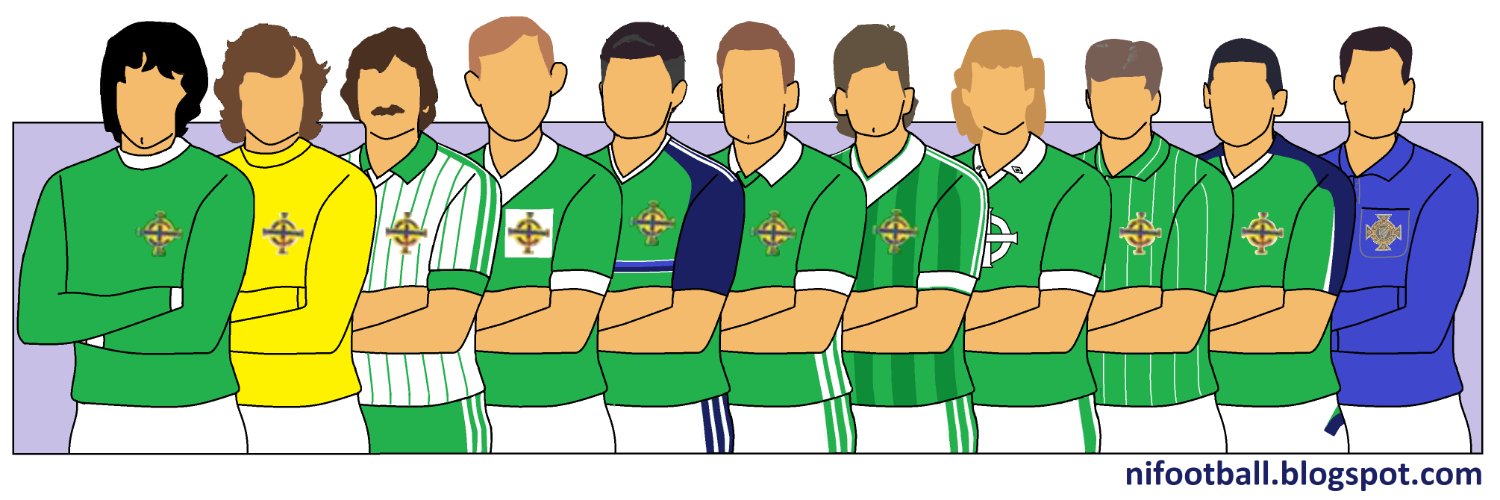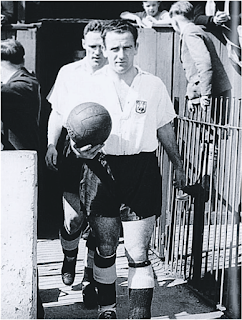Reg Ryan ‘The Schemer”
Part Three
By Gavan Bergin
On November 18th 1952, Reg Ryan was playing for Ireland against France at Dalymount Park in Dublin when the crash barriers at each end of the ground broke and the crowd spilled onto the pitch, causing the match to be halted by the referee. It was a scene of mayhem, with the loudspeaker booming out threats to abandon the game, while ambulance men carried away people who had fainted in the crush. After a while, though, the Guards restored order and, with spectators sitting on the ground all along the touchline, the game restarted. France were quick to get back on top of the play, they immediately forced some good chances and within a minute or two they had the ball in the Irish net again-but their goal was ruled out again because of handball. That didn't go down well with France, who began to show their irritation at some supposed sharp tackling by Ireland . The French
players lost their tempers, then they lost their discipline and retaliated with rough play of their own. Unsurprisingly, the Irish players responded by going in with even harder challenges, and the situation began to escalate again. As the Irish Independent reported, “the referee for a spell appeared to have lost his bearings, as he allowed football to degenerate into all-in wrestling, and following the stoppage of play for yet another foul we saw the unprecedented happening of the a Frenchman running for his life like a hare at Clounanna, dodging between spectators as he was chased by Bud Aherne down the
touchline before escaping through the tunnel to the dressing room”.
players lost their tempers, then they lost their discipline and retaliated with rough play of their own. Unsurprisingly, the Irish players responded by going in with even harder challenges, and the situation began to escalate again. As the Irish Independent reported, “the referee for a spell appeared to have lost his bearings, as he allowed football to degenerate into all-in wrestling, and following the stoppage of play for yet another foul we saw the unprecedented happening of the a Frenchman running for his life like a hare at Clounanna, dodging between spectators as he was chased by Bud Aherne down the
touchline before escaping through the tunnel to the dressing room”.
That interruption didn't last too long and soon enough all the players were back on the field. When play restarted France still seemed distracted, and Ireland took advantage, with Reg the fulcrum of the attacking moves. He was forceful and creative on the ball, playing quick short passes to keep possession for Ireland until, seemingly out of nowhere, he let go a perfect long through pass into space on the left wing for Eglinton, who ran on to the ball, took it and darted for the penalty area, and it looked like he might get through but he was challenged by a French defender who put the ball out. It was an Ireland corner kick, and as the ball was placed, the sound of the crowd plunged almost to silence, except for a low hum of anticipation. Then the kick was taken, the ball hit high went up and then came down into the packed penalty box with bodies flying everywhere. France had chances to clear but they made a mess of them and the ball bounced around once or twice before being bundled in to the goal by Glasgow Celtic's Sean Fallon. A goal! A goal! 1-0 to Ireland!
Amazingly, considering all the action that had taken place on and off the pitch preceding the goal, only 24 minutes of the game had elapsed when it was scored. So Ireland had a long way to go and they didn't make the mistake of sitting back on their lead. No, they went forward again and pushed France back into defence. But they dealt with the Irish raids then counter-attacked, and in one move they broke upfield and played the ball into the box, where it was intercepted by Ireland's captain, Carey, who appeared to have handled the ball. As a result, the France players vociferously appealed for a penalty, but the ref ignored their pleas. Cue more uproar. As the Irish Times reported, “the French were really roused and they laid a furious onslaught on the home goal. Boots became too evident, fists were raised and usually cool players were seen to sweep into the affray with the glint of battle in their eyes. The next ten minutes were more like something from the Napoleonic Wars than a soccer match. The heat was further generated when Ireland's Eglington was fouled in, to say the least, a dangerous manner. That incident culminated in a scuffle between the French keeper and an Irish forward.”
Somehow there were no major incidents in the closing stages of the first half, but tempers were frayed and tension was high until the halftime whistle “saved the probable drawing of swords” according to the Times.
The second half began well for Ireland, who went mighty close to scoring early on, when Reg "hit a blockbuster at goal". And, although France countered strongly again, they were repeatedly denied by resolute Irish defenders who frustrated the French forwards throughout the second half until the 67th minute, when Kopa got the ball and went on a run from midfield into the Irish area, where he played a precise pass in to his striker Piantoni, who fired a snap shot into the goal. The equaliser. 1-1. France had their equalising goal, and the momentum, and with about twenty minutes left to play, they were well set. All they had to do was keep going like they had been for most of the game, to keep pushing and they would surely get the winner. And so they did, they kept on going forward, putting pressure on, and they never let up for a moment all through the rest of the match, and their goal was all but inevitable, it was on the way, it was coming for sure, everyone knew that. Yet it kept not arriving, and all the while time kept passing, ticking away, second by agonising second. Twenty minutes and more elapsed, and still France couldn't break through to score. The heroic Ireland defenders saved the game and secured the 1-1 draw, a mighty impressive result As the Irish Independent match reported, “ It was a dramatic international, full of excitement and drama and marked by fierce displays of temperament, fine football-and some anxious moments for spectators when the barriers at both ends of the ground gave way. If it was excitement the crowd wanted they got it in plenty. The result was fair, Ireland played with great dash, particularly Reg Ryan, who cut great gaps in the French defence and was our most successful forward. Full of resource in defence, always ready to have a shot and a strong dribbler, he fully justified his selection for such a tough match.”
That result against France put Ireland in good stead for their next match, against Austria in Dublin on March 25th 1953. And they won, 4-0. Reg got a few goals in the next few games. On October 4th 1953, he scored his first international goal for Ireland in their World Cup qualifying match against France, and a few weeks later he scored again in their next qualifier, against Luxembourg .Then, in November '53, he produced another top class performance in Ireland's third qualifier, against France in Paris. Unfortunately they lost that game 1-0, and that was the end of Ireland's chances of qualifying for the 1954 World Cup.
That match was also the last of Reg's consecutive appearances for Ireland. And, though he made a dramatic return to the side by scoring Ireland's winning goal against Norway in November '54, his time as an international player was coming to an end. His final match for Ireland was against Spain at Dalymount Park on November 27th 1955. At that time, he was a thirty year old Third Division player who hadn't played international football for more than a year. It would've been no great surprise if he had struggled against Spain, but that didn't happen. Instead, he rose to the challenge and, for one last time, he ran the show in the Irish midfield . He was stubborn in defence and clever in attack, and the match finished 2-2, which was a very good result for Ireland. He deserved to be be proud as he bid his last farewell to the Dublin crowd.
After he retired from playing in 1961, Reg was employed as chief scout for West Brom, Derby, Aston Villa and Leeds. That work kept him involved in football for the rest of his life.
When he died in 1997, football fans far and wide remembered him.
As the Warwickshire Sports Argus said:
“Reg Ryan. There was action and artistry for you”
Other articles by Gavan Bergin
- Joe Bambrick (Linfield FC)
- Billy Gillespie: Goalscorer (NewsFour)
- Bill McCracken: A Master of Defence (News Four)
- Charlie Hagan: The Entertainer (part 1) (part 2) (News Four)
- Patsy Gallagher: The Might Atom (part 1) (part 2) (News Four)
- JJ Ledwidge: The Calm Quiet Champion (News Four)
- Val Harris: Valentines Days (News Four)
- Elisha Scott: The Black Panther (News Four)
- Archie Goodall: The Cast Iron Footballer (News Four)
- Matthew Gunner Reilly (News Four)
- Ireland: Champions 1914 (News Four)
- Jack Kirwan (NIFG)
- Frank Thompson (NIFG)
- Bud Aherne (NIFG)


Comments